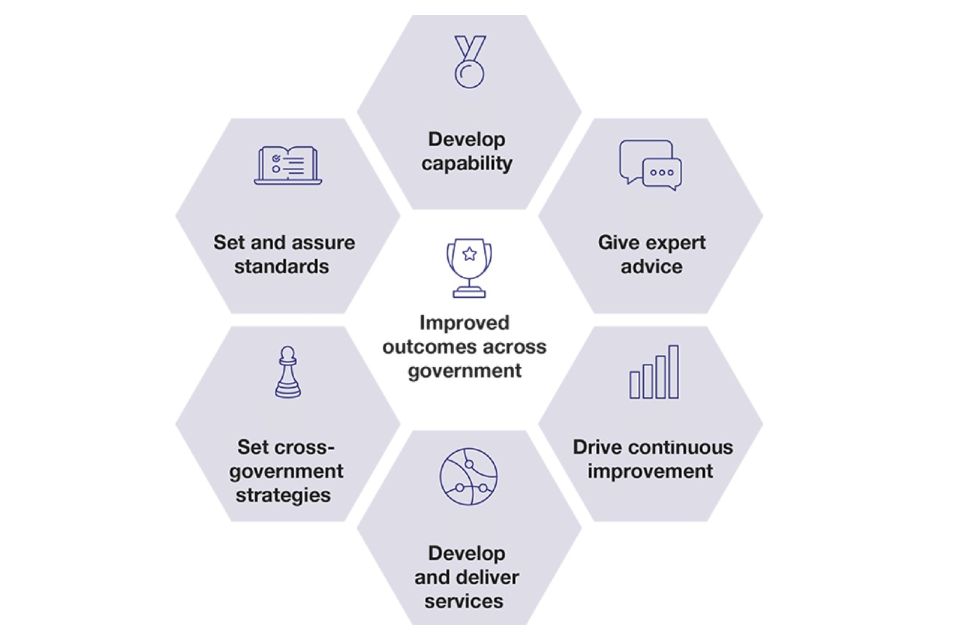Government functions
Published 2 August 2022
What is a function?
A function is a grouping aligned across government to manage functional work such as human resources, commercial, or finance. Functions are embedded in departments and arm’s length bodies.
Functions form a framework for collaboration within organisations and across organisational boundaries, to support efficient and effective delivery of policy, outcomes and services.
Their mandate (or authority) flows from Parliament and ministers through Managing Public Money and the Functional Standards
The purpose of each function
The purpose of each function is summarised below. See Functional standards for more detail.
Analysis: to plan and undertake analysis to support well-informed decision making, in order to deliver better outcomes.
Commercial and grants: to drive consistency in the planning and management of procurements and grant making, ensuring contracts and grants realise value for money and support the delivery of high quality public services
Communication: to deliver responsive and informative public service communication that supports government policy and priorities, and assists with the effective operation of public services.
Counter fraud: to ensure the effective management of counter fraud, bribery and corruption activity in government
Debt: to drive consistency in the management of debt owed to government organisations, minimising losses to the exchequer, protecting taxpayers’ money and minimising unnecessary stress on debtors
Digital, data and technology: to raise the profile of DDaT and give government leaders the necessary skills to make informed decisions and support the delivery of consistent and excellent digital services and user experiences, the use and sharing of data, and the building and deployment of technology.
Finance: to ensure that public funds are managed and used effectively
Human resources: to lead and manage human resources activity across government, ensuring people are recruited, developed and deployed to meet the government’s needs
Internal audit: to enhance the effectiveness and efficiency of governance, risk management and control in government organisations
Project delivery: to direct and manage portfolios, programmes and projects to ensure value for money and the successful and timely delivery of government policy and business objectives
Property: to ensure government property is well managed, designed, constructed and operated; is efficient and provides value for money; is safe, secure and sustainable; and meets the needs of those using the property
Security: to protect the government’s assets (people, property and information), including visitors to government property, third party suppliers engaged on government business, and citizen data
Functional standards
Functional standards are mandated for use by departments and their arm’s length bodies. They bring together and clarify what needs to be done, and why, for the different types of functional work. They support efficient, coherent and consistent management.
This 2 minute animation gives an introduction to the functional standards:
How can functional standards help me?
Functional standards support normal assurance arrangements. They are used by local teams, functional experts and independent assurance providers to improve the way functional work is done.
Activities common to each function
A function sets direction for a particular type of functional work, such as commercial. In addition, Government functional standard GovS 001 sets consistent expectations for management of the functions, including the roles and accountabilities needed.
The standard covers the activities that are common to each function, which include:
-
Set cross-government strategies and ensure consistent delivery across government
-
Set and assure functional standards so that expectations for each type of functional work are clear, coherent and consistent, and there is a stable basis for assurance, risk management and capability building
-
Develop functional capability including leadership, skills, resources and capacity (people, equipment, facilities), working closely with government professions to specify the right professional competences, induction and training
-
Give expert advice on strategy, business planning, compliance with standards and controls, how to drive up efficiency and effectiveness, and specific topics (such as complex commercial transactions or employment issues)
-
Develop and deliver commonly required services and products, either directly or through third parties (note that many internally focused shared services are delivered on behalf of the functions by Government Business Services)
-
Work across government to drive continuous improvement in the way functional work is done, for example
-
support organisations to assess how well standards are being met, and to make improvements
-
provide authoritative cross-government requirements and guidance so that organisations don’t have to do this individually

(Source: GovS 001, government functions)
Government professions
A government profession develops the capability of a group of people with particular skills, knowledge or expertise, and works across government on behalf of organisations and functions. See for example the government legal profession.
For more detail on government professions, please see: Professions - Civil Service Careers
Useful links
Functions provide expert advice on the operation of Cabinet Office Controls - GOV.UK
Cross-function publications of interest include:
-
The Declaration on Government Reform - GOV.UK which includes actions on functional standards and controls
-
Lord Maude’s review of the cross-cutting functions and the operation of spend controls was published in 2021, and a progress update was published in 2022
